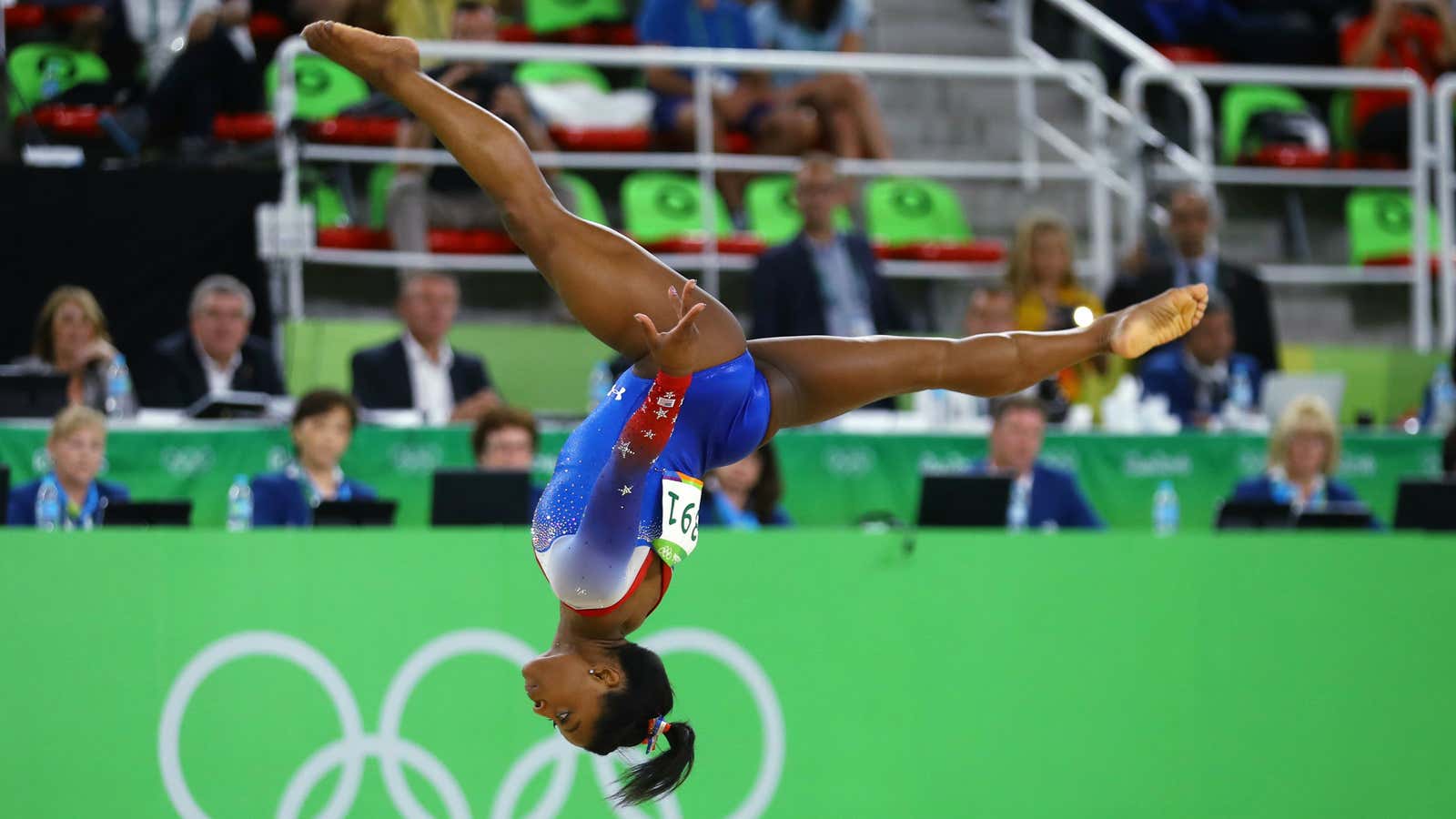If watching your four-year-old score a goal ignites an irrepressible inner thrill in you, imagine the feeling of being the parent of one of those beaming Olympic medal winners up on the podium. It poses an obvious question: would you want your child to be an Olympian?
To many sane-seeming parents, the answer is a resounding no. The sacrifices are epic. Kids have to commit early, leading them to miss out on “normal kid” life and unstructured summers. They often try multiple sports like basketball and running before committing to 30-35 hours a weeks in a gym whipsawing around the uneven bars or catapulting over the vault (Simone Biles started at age six, and told Ellen DeGeneres that was “really late for a gymnast”).
Elite athletes have to be obsessive about weight and food, injuries are almost guaranteed, and prospects post-Olympics can be grim. The harsh reality is that most Olympic athletes don’t make it onto the Wheaties box or get sponsored by Nike.
High-stakes competition takes a toll on parents too, especially if they work and are not wealthy. There are endless practices, often starting at 5 am and reaching into the evening. There’s the sky-high price tag for some sports, like ice skating, with equipment and ice time, lessons, and conditioning. And there’s the family sacrifice: if one kids goes all in, kid two and kid three are not getting the same attention and resources.
But these parents are focusing on the wrong things.
The case for being that crazy parent
Pursuing a sport at the highest level isn’t about going to the Olympics, but about making those epic sacrifices. The endless trainings and trade-offs build the character traits most of us are desperate to instill in our kids: discipline, perseverance, teamwork, determination.
One former Division I lacrosse player explained it to me this way: “Everyone told me I was crazy to miss out on the ‘normal’ college experience to play a sport that had no professional prospects. But I loved being on the team, and competing at that level. I wouldn’t trade that for anything.” (He’s applying to medical school now.)
As well as some enduring friendships, competitive athletes know how to set goals and make plans to reach them. They’ve figured out how to get up early, manage their time, take constructive criticism, focus, and deal with disappointment.
It’s no big surprise that employers love athletes that can transition away from their sports. Goldman Sachs has a healthy roster of them and Richard Branson lists the reasons why he loves to hire them. One of his top reasons: athletes know how to fail. Andy Memmel, dad to Chellsie Memmel, an American gymnast who competed in gymnastics at the 2008 Olympics told Parenting magazine: “The biggest thing we’ve taught her in life is that life isn’t fair. You can work as hard as you want but it might not turn out the way you want.”
Exposing kids to situations where they can fail is actually something beneficial parents can do. Not even Simon Biles wins every time.
No such thing as a free lunch
There are costs to letting kids compete at high levels. Biles and Aly Raisman practice five to six hours a day, six days a week, which doesn’t leave a huge amount of time for anything other than school. (Michael Phelps’s schedule looks similar, and that’s without the added weightlifting and stretching.)
Elite competition is not cheap. Nick Holt, a professor at the University of Alberta’s Faculty of Physical Education and Recreation in Edmonton, estimates the cost to be anywhere from $10,000 to $30,000 a year, depending on the sport (including club fees, private coaching, uniforms and equipment).
Travis Dorsch, an assistant professor at Utah State University who studies parents’ engagement in their children’s sports, told the New York Times that spending on youth sports—not the Olympic kind—is now up to up to 10.5% of gross income, which takes a toll on overall family well-being.
Many doctors lament kids focusing on one sport too early. The practice has led to a spike in injuries, as the intensity of a single-sport focus puts too much pressure on developing bodies. In 2013, the American Medical Society for Sports Medicine issued a position paper (pdf) on “Overuse Injuries and Burnout in Youth Sports” arguing that “Early sport specialization may not lead to long-term success in sports and may increase risk for overuse injury and burnout.”
Parents should encourage as many sports as possible for as long as possible. (According to US Youth Soccer, 7 in 10 Olympic athletes said they played multiple sports growing up.) DA Franklin, Team USA swimmer Missy Franklin’s mom, said that Missy tried swimming, skiing, soccer, gymnastics, figure skating, dancing, basketball, and volleyball before deciding to focus on volleyball and swimming.
“Encourage kids to try lots of different sports so they find out what they enjoy, and what they’re good at,” she said (noting that at over six feet tall, skating and gymnastics were fairly unlikely choices).
Go for gold
So parents who want to take on the prospect of parenting an aspiring Olympian should go in with their eyes wide open. It will be expensive, time consuming, and your kid will probably end up injured. Your other kids may hate you, and you may turn into a crazy person when your competitive water polo player announces she wants to quit after you sunk all your time and money into meets in Hawaii and Fiji.
But if your kid loves a sport, and she’s doing it for her, and not to get a scholarship, or because you want her to get a scholarship, it may not be the craziest idea in the world to support that passion. It probably won’t last, and the outcome may well be more discipline and focus than most of us could dream of.
And if your kid actually ends up with a medal, it might feel half as good as that four-year-old soccer goal.
